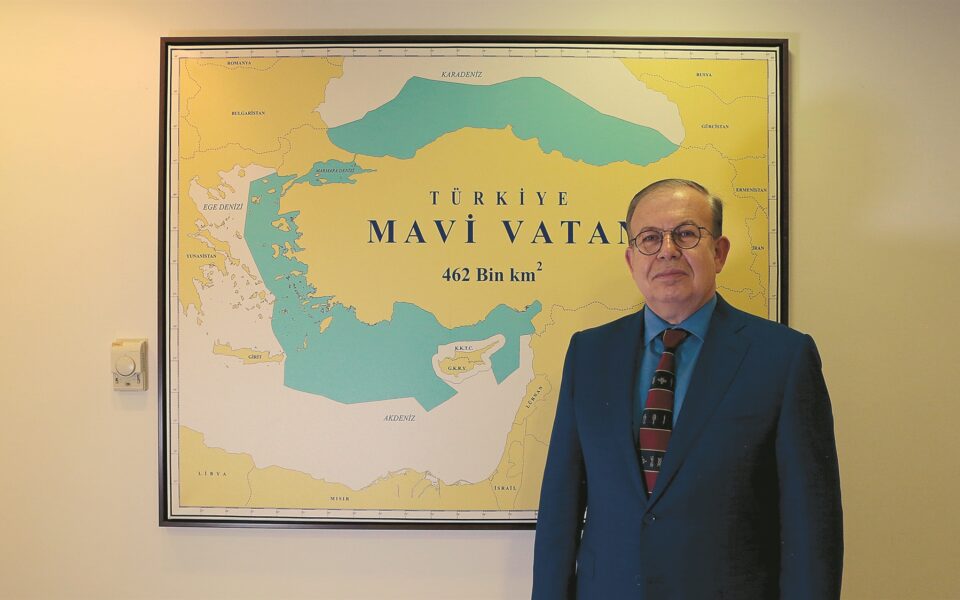Materializing the ‘Blue Homeland’ doctrine
Retired admiral, one of the architects of Turkey’s expansionist maritime dogma, speaks to Kathimerini

Fresh fuel was thrown onto the already volatile Greek-Turkish relationship in 2019 in the form of a map that was made public in a photograph that had Turkish President Recep Tayyip Erdogan standing in front of it. It was a map of the so-called “Blue Homeland” (or Mavi Vatan in Turkish), a theory encapsulating Turkey’s new expansionist agenda. The map depicts the Aegean Sea as being divided between Turkey and Greece, with dozens of Greek islands shown as being on the Turkish side. That map has since acquired political substance and is a constant feature in Turkish complaints to the United Nations regarding maritime zones, based on Ankara’s interpretation of international treaties and bilateral agreements.
Kathimerini reached out to one of the theorists and architects of the “Blue Homeland,” retired admiral Cihat Yayci. A former chief of staff of the Turkish Navy, Yayci is now a professor and president of Bahcesehir University’s Maritime and Global Strategies Center, and one of the key proponents of Turkey’s expansionist doctrine.
In what can only be described as a charged discussion on the subject, Yayci, who is also the architect of the Turkey-Libya maritime demarcation accord, analyzes the Turkish side’s positions.
Admiral Yayci, how did the Blue Homeland doctrine come to be?
The basis of the Blue Homeland doctrine represents the current spots and emphasizes the Turkish maritime jurisdiction areas. To begin with, it is a term that is accepted by the Turkish public, but also internationally. It is just a doctrine that defines the maritime areas under Turkish jurisdiction and the means by which they are safeguarded legally, diplomatically, financially and politically. My work on this is defined as non-military.
You have said that the map is designed to be used mainly for academic purposes, yet we have seen photographs of President Erdogan posing in front of it. What are Turkey’s claims on the basis of this doctrine?
This map is not maximalist. First of all, it is not even optimized. It is between optimal and minimalist. If you look at the Greek maps which represent Greece’s claimed maritime jurisdiction areas, they don’t allow for any Turkish territorial waters in the Aegean Sea at all. The [Blue Homeland] doctrine is upheld by the public and the public administration. It is also upheld by the laws of our nation and by our government. My map, which is the one behind Mr Erdogan, is based on international law. It is drawn on the basis of the principles of accountability, sovereignty of land and sea, geographical superiority and on how [in terms of defining maritime zones] the mainland is superior to the islands. These are principles of delimitation that derive from the international courts’ decisions on the archipelago and from the United Nations. Blue Homeland makes recommendations on how should be shaped and what has to be the legal stance towards illegal demands and the use of illegal means. So this doctrine is about how we can defend our maritime rights and interests.
President Erdogan and other government officials are demanding the demiliarization of the Greek islands. Greece responds by citing Article 51 of the UN Charter regarding the “inherent right of individual or collective self-defense.” Is Turkey going to insist on the islands’ demilitarization?
Article 51 concerns Turkey’s legal right to defend itself, not Greece’s. The reason is that these 23 islands were supposed to have been demilitarized under the provisions of the 1914 treaty and the decisions of the ambassadors of the six Great Powers, the 1923 Lausanne Treaty, and the Treaty of Paris of 1947.
‘Greece is not an archipelagic state. Greece is a peninsular state and the islands are in the Adalar, the Aegean’
Tell us about the Turkish-Libyan agreement. What legal basis does it have?
Let me just say that every country has the sovereign right to sign an agreement. No one has the right to tell a country what it can and cannot sign.
Is this the case even when the said agreement violates the territorial waters of the islands of Crete, Rhodes and Kastellorizo?
It is a misunderstanding or misinformation or propaganda that the line between Turkey and Libya interferes with the territorial waters of any island. I am the one who drew that line. If you look at the line connecting the coasts of Libya and Turkey, you will see that it passes an area 40 miles away from Crete. We do not interfere with anyone’s territorial waters.
But it does encroach on the exclusive economic zone.
This attitude really is unique to Greece. Greece is trying to represent itself as an archipelagic state that consists only of islands, like Japan or the Philippines or Indonesia. Well, Greece is not an archipelagic state. Greece is a peninsular state and the islands are in the Adalar, the Aegean. I use the term “Adalar” instead of Aegean Sea. The Adalar is a very narrow sea, with a width of approximately 150 and 180 miles. Therefore, the continental shelf of the mainland comes to nearly 350 miles. So, if the sea between Greece and Turkey stretched across several hundred miles, there would be no problem, and if, of course, there wasn’t one particular island [Kastellorizo]. For example, if this island lay 700 or 500 miles from Turkey and from Greece, we could say that it had an exclusive economic zone and a continental shelf. This is not the case, however. We are talking about a narrow sea that is not even 200 miles between two countries, two states. So, some of these islands, and especially those that Turkey claims are along the median line, are on the Turkish mainland’s continental shelf, while the others lie mainly on the Greek continental shelf. Therefore, if an island is already on a continental shelf, it cannot create another continental shelf. This is a logical rule and that sets a legal rule.
Moreover, Greece is not an archipelagic state. Its argument that its maritime jurisdiction line begins from the outer line of its islands is illegal. The maritime jurisdiction line should be defined in relation to the mainland. During the UN Law of the Sea Convention – allow me to remind you – Greece had insisted on being acknowledged as an archipelagic state, like Japan or Indonesia. No one agreed to this, however, and Greece was told that it is a peninsular state. This is why Greece did not sign the agreement; because Greece insists that the article differentiating archipelagic states needs to be changed.
Do you believe that Turkey will proceed with drilling based on the agreement with Libya?
Yes. To begin with, we signed an agreement with the legitimate government, the Government of National Unity. All the domestic legal procedures were carried out and were then presented to the United Nations.
But the president of the Libyan Parliament rejected it.
This is a memorandum and by law memorandums are not subject to Parliament’s approval. The council, moreover, cannot sign a memorandum and, what’s more, don’t forget that there is no real elected parliament in Libya right now. The Libyan Parliament collapsed eight years ago and there have been no elections since. So let me give you some good news. Representatives from the Parliament in Tobruk, to which you are referring, came to be four months ago and I was there to brief them. Because of Greek propaganda they had been thinking, “We’ve lost a maritime area,” “Turkey forced us to sign an agreement and has taken our maritime area,” “We would have gained more, a larger maritime area, if we had signed an agreement with Greece.” That’s how they saw it and I was able to show them that if they had signed a maritime jurisdiction agreement with Greece, they would have lost at least 40,000 square kilometers of maritime area compared to the agreements they signed with Turkey. I showed them a chart with Greek offers and we compared it to the Turkish offer.

‘Save money, buy weapons from Turkey’
Greece has been strengthening its military arsenal by investing in new frigates and fighter jets. Do you think that Turkey is in a position to deal with the shift in the balance of power?
You are Greece, buying weapons and missiles, frigates and aircraft, helicopters, ships and submarines. All this is indeed frightening and intimidating, but please don’t forget that Turkey builds all these weapons, ships, missiles and even aircraft. And unmanned aerial vehicles, of course, and submarines and many, many more vehicles, while also ensuring that our country is among the world’s top 14 exporters. But if Greece wants to save some money, it can buy weapons, frigates, corvettes and submarines from Turkey. I would advise it.
We’re not investing in landing capabilities. This is the difference in the acquisition of the new frigates. It does not mean that we have offensive capabilities.
That is neither an excuse nor an acceptable reason. Just look at your sports stadiums. What do you call it in Greek? “Constantinople Athletic Club” [AEK], right? They just inaugurated a new stadium named “Hagia Sophia.” What I am offering Turkey right now is a response to the AEK stadium. Think about that. We will also attach names, like for Thessaloniki or certain villages, Turkish villages in Western Thrace.
‘Turkey will not tolerate Greece extending its waters even a centimeter beyond 6 miles. If Greece wants to maintain peace, stability and security in the region, it must abide by the agreements’
Would Turkey react if Greece were to extend its territorial waters to 12 nautical miles on the basis of the Law of the Sea? And if so, would this reaction mean war (casus belli)?
Let me just clarify the declaration of the 1996 Turkish National Assembly. It is not a direct declaration of casus belli. There is no such “cause of war” in this declaration, but it was done in order to give the government all the different national powers, including to take military measures, if Greece extends its territorial waters in the Aegean Sea beyond 6 nautical miles – and obviously not to 12 nautical miles. It was always about the 6 miles. Turkey will not tolerate Greece extending its waters even a centimeter beyond 6 miles. If Greece wants to maintain peace, stability and security in the region, it must abide by the agreements. There is only one agreement that was signed by Greece and Turkey together, and which establishes the status quo in the Aegean Sea: It is the Treaty of Lausanne. With respect to the Treaty of Lausanne, the territorial waters are 3 miles. Greece had increased its territorial waters to 6 nautical miles from 3 in 1936, and we agreed to that nevertheless, and in 1964 Turkey agreed to make it 6 nautical miles. But the only agreement both sides had signed was the Lausanne Treaty. And allow me to say that UNCLOS [United Nations Convention on the Law of the Sea] is a convention from 1982 to which Turkey is not a signatory, so any attempt to impose its provisions on Turkey is obviously unlawful, unjust and arrogant.
We have reached the end of our discussion. I want to thank you for sharing Turkey’s views and positions.
We can do better. We should have a better future together. This should not be a problem between two states, two nations. So let’s make it happen. Let’s live in peace. Let’s benefit together from the sea, the coast, the air, from everything.





